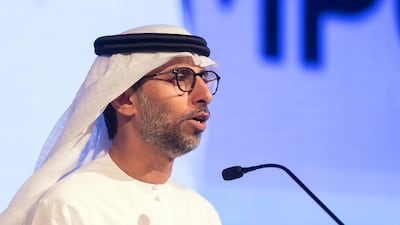The compliance by Opec and its allies to voluntary cuts in crude production climbed to a record in April as the oil producing nations closely watch market and crude inventories.
Conformity by Opec and non-member countries that are part of a global alliance to rebalance oil supply, rose to 168 per cent, the highest level since output curbs were agreed in 2017, Suhail Al Mazrouei, the UAE Minister of Energy and Industry said following the Joint Ministerial Monitoring Committee (JMMC) meeting in Jeddah.
The UAE energy minister said the stability of the global oil market is of paramount importance as it would encourage and attract investment needed to boost output capacity to meet the increasing demand for oil.
In the wake of a slump in oil prices, Opec+, as the alliance led by sovereign producers Saudi Arabia and Russia is called, undertook measures to reduce oil supplies at the start of 2017. The conditions of the pact were reset at the start of January this year with members agreeing to collectively cut oil production by 1.2 million barrels per day for six months. Opec+ will meet in June to decide whether to extend the pact. Compliance among the alliance has not been uniform early into latest round of production cuts.
Russia, the largest producer in Opec+, was slow to cut production, while Iraq, Opec’s second-biggest member did not fully comply, however the latest available data shows the compliance levels have risen significantly.
Mr Al Mazrouei said the JMMC requested that the Joint Technical Committee and the Opec Secretariat continue monitoring and analysing oil market developments. Close monitoring of oil inventory projections in the coming weeks in particular, is important for making recommendations to pact members and taking appropriate actions in the second half of 2019, the minister added in a statement carried by the UAE’s state news agency WAM.
Opec's next meeting is scheduled to take place June 25-26 at the group's headquarters in Vienna.
Opec+ will finalise a charter in June to mark their evolution into a supergroup, the UAE Energy Minister said in March.
In its meeting last week the JMMC indicated the readiness to rollover ongoing production cuts well into the second half of the year. Saudi Energy Minister Khalid Al Falih, at the Opec technical committee meeting in Jeddah, said Opec+ should stay the course on production cuts.
"So far I’m not concerned about demand. US demand has gone up significantly and I think Asian demand has picked up [as well],” Mr Al Falih said from the Red Sea city. "Chinese demand over the 12 months has gone up easily by 50 to 60 per cent. Indian demand is going up, Japanese demand and Korean demand has gone up. Demand growth is at healthy levels.”
He added however, that the market needs to be careful during the second half of 2019 in the event of any “demand shocks”.
Oil prices, supported by supply concerns and rising geopolitical tensions, have reacted positively to Opec's intentions to continue production cuts in the second half of this year.
Brent, the benchmark against which about half of the world’s crude is priced, rose for the second day on the London-based ICE Futures Europe exchange, after adding 2.3 per cent last week, Futures for West Texas Intermediate on New York Mercantile Exchange also rose on Tuesday following a 1.8 per cent gain last week.
Oil prices will overcome the current trade- war gloom and push higher as investors put aside their temporary bearishness to focus on tightening supply fundamentals, according to Citigroup.
The US lender sees Brent crude rising to $75 per barrel --
around 4 per cent above current levels -- in the short term and possibly overshooting toward $78 level, Bloomberg cited Ed Morse, Citi's global head of commodities research, as saying in a note.


